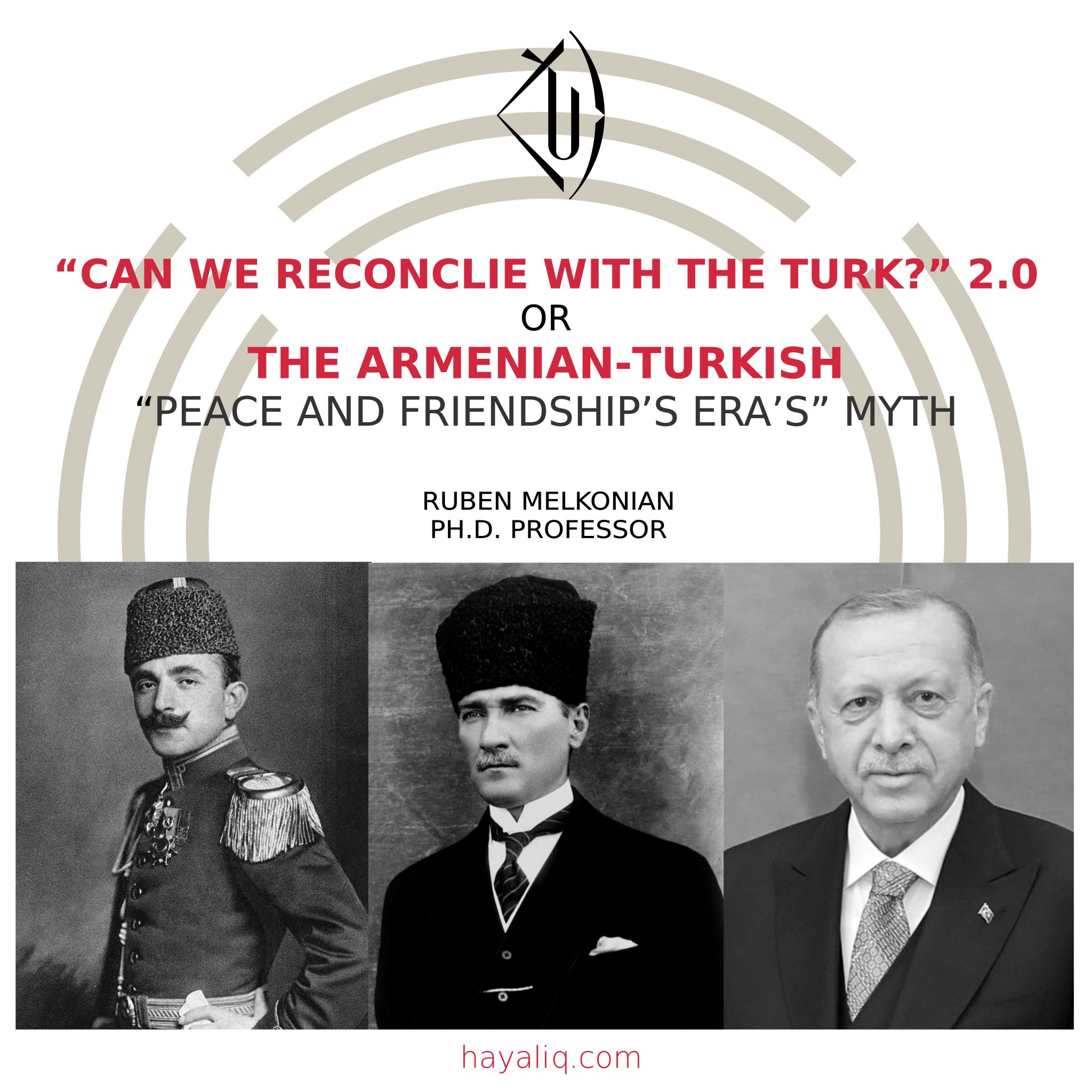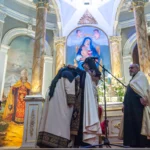Hayaliq.com-The negotiations between the de facto authorities of Armenia and Turkey in recent months, which foreshadow the new capitulation of Armenia, are also considered wrong and extremely dangerous by experts. “Armenian Wave” presents the extensive analysis of the famous Turkologist, Doctor of Historical Sciences, Professor Ruben Melkonyan, in which a detailed reference is made to the essence of the ongoing negotiations and the possibility of reconciliation between Armenia and Turkey in general.

Ruben Melkonyan
Turkologist, doctor of historical sciences, professor
About 100 years ago, Zarevand asked the not so rhetorical question, “Shall we reconcile with the Turks?”, and he answered himself with a pamphlet of the same name. Although there have been some changes in both regional and global politics over the past 100 years, some realities have remained the same. Armenian-Turkish relations have an important place among them.Currently, with a “strange” coincidence and fervor, the authorities of this moment, some “independent” analysts and propagandists around them have put into circulation the issue of Armenian-Turkish reconciliation or managing the enmity and unwittingly became the addressee of Zarevand’s exhaustive answers given 100 years ago. The principle of freedom of speech has not deprived anyone of the right to express thoughts, but no right can be superior to objective realities, facts, so in these heated artificial and dilettantish discussions of “reconciliation with the Turks”, it is simply necessary to add one and the most important professional observation, the Turkological one.
Turkology is an “exact science”.
As a starting point and even a little metaphorically, I must emphasize a fact that has been fixed for a long time: Turkology is an “exact science”. therefore, to make observations about Turkey, complex Oriental/Turkic knowledge is needed. Many non-Turkologists can have and express opinions about Turkey, Turks, but without offending, I must note that many of these opinions have a high probability of being partially correct, partially dilettantish, or at least vulnerable. Just as a Turkologist’s views on medicine, astronomy, or biology may fall within the above characterizations.Although there is a similarity or parallel between Turkology and medicine: just as a doctor cannot see the health problem and remain silent, so a Turkologist cannot see the wrong perception of Turkey, its politics, voice wrong views and remain silent.
Is Armenian-Turkish reconciliation possible?
I think there is no rational person who does not want reconciliation and peace. these are dogmatic realities and it is not necessary to build another populist thesis on this fact that we want to open an era of peace, as if others also want to open an era of war. However, comparing the current situation and the unchanged policy of Turkey for decades, we can say that currently Armenian-Turkish reconciliation is possible only one-sidedly, at the price of a concession from the Armenian side.What will we give up? first of all, for us, the red lines, which include the military, political and economic security of Armenia, the idea of statehood, national dignity, historical memory, culture, spiritual heritage, liberation struggle, military successes, devotees, etc. However, this humiliating concession is now called “liberation from stereotypes” in the fashionable term.The important stage of this “liberation” process began after the change of government in 2018, because the supporters of “breaking stereotypes”, who were the carriers of such thinking and engaged in grant, journalistic, “political activist” activities, took power and began to control state levers. Therefore, from 2018, the state of Armenia became the bearer and implementer of the idea of ”breaking stereotypes”. That “joyful” news was brought to the Armenian people by the unknown Bolton, who literally advised to “get rid of historical stereotypes”.The Boltonian postulates became a guideline for the current authorities, they began to be manifested in various fields, as well as in the speeches of the ruling faction’s deputies, during the 2021 election campaign and in the interviews of public figures who are physically or ideologically close to the government.
So, let’s say: Armenian-Turkish reconciliation, which is similar to the Turkish preconditions-compulsions, is possible:
⦁ If you abandon Artsakh.
⦁ If you allow to conquer the sovereign territory of Armenia without hindrance.
⦁ If you agree to be a dummy state.
⦁ If you forget your past.
Should we talk to Turkey?
Among the “pragmatists” the following fact is almost a fetish: it is necessary to talk and reconcile with Turkey. From the beginning, I should mention that I am in favor of talking with Turkey, as well as peace, but the whole question is how, under what conditions is that dialogue possible, let alone peace? As a specialist and without any exaggeration or emotionality, I want to clearly say and assert that in the Turkish collective perception, the option of communicating with Armenians is based on inequality, humiliation, contempt. that is, the Armenian-Turkish dialogue is not a conversation between equals, but between the strong and the weak, the dictator and the executor.In the recent Armenian-Turkish contacts, this is clearly manifested and if we remove the light ceremonial elements of obligatory Eastern-Turkish affection, which are present in the words of Turkish officials (Çavuşoğlu, Kılıç), then the Turkish dictate mentioned above is obvious. I hasten to say that at any previous stage of the Armenian-Turkish negotiations, Armenia did not agree to unequal contacts and Turkish dictates. maybe that’s what “secured” the unsuccessful outcome of that dialogue.
The next thesis of the “pragmatists” is that Turkish aggression can be stopped thanks to the Armenian-Turkish dialogue. this idea can be implemented only and only in the appropriate geopolitical, regional situation and conditions, not in all cases and through direct dialogue. This could be called the political or expert self-deception of the authorities and the “independent” analysts who support them, but it seems to be more correctly described by the famous Russian phrase “Слышал звон, да не зниать, где он”.If they want to mention the football diplomacy of 2008-2009 as an example of justifying their actions, then it was in a completely different situation, a completely different process. Without an appropriate geopolitical context, without various levers, only negotiations with Turkey, even good, friendly relations, have never been able to stop Turkish aggression. For example, Turkey and Syria had good relations in the 2000s, Erdogan and Assad were close even as families, but all that changed in a matter of days and Turkey started a terrorist war against Syria, occupied (and is still occupied today) part of its territory, and Erdogan began to turn to his “friend” Assad in the most offensive terms.
By the way, in the previous years, certain circles that are part of the current government, or close to it, or at least loyal to it, were actively engaged in various programs of the Armenian-Turkish dialogue and, in parallel, actively received various grants for it. The main motivation was the goals that caught the attention of the international community: “elimination of Armenian-Turkish enmity”, “dialogue”, “peace”, “formation of mutual understanding between societies” and so on. There were also “independent” Turkish intellectuals advertised in Armenia, who fought against the policy of Turkish denial, spoke about the Armenian cultural heritage in Turkey, and were “friends of Hrant Dink”.Now I want to ask a rhetorical question. So many years of efforts, programs (which sometimes reached the point of absurdity and very poorly concealed the lack of a say, political order and the desire to launder money), the money spent, did they have any benefit? How and to what extent did all of this prevent anti-Armenian hatred in the Turkish society, how much did it restrain the leadership of Turkey, so that the country in 2020 just not to participate in the brutal aggression against Artsakh Armenians. Did any of those “brave”, “Armenian-loving” intellectuals of Turkey make a public criticism of the beheading of unarmed elderly Armenians in Artsakh, the use of phosphorous weapons, and the vandalism of churches?Therefore, before speaking with a serious face, the “pragmatists” should first give a unique report about the failure of their previous stage of activity. But no, they not only don’t do that, but with new momentum, more broken stereotypes and new obsession, they have embarked on the implementation of new grant programs. And to the defenseless Armenian society, new falsehoods and theses about the non-existent “great” Turkey are imposed.
Armenian-Turkish friendship has never existed and does not exist
Continuing the thesis that Turkish studies is an “exact science”, I want to put forward and substantiate another idea: Armenian-Turkish friendship did not exist, does not exist and cannot exist in the near future. I’m talking about all the meanings understood under the word friendship, which are available, for example, in the explanatory dictionary of Armenian. I note with surprise and concern that the famous and false Turkish thesis is spreading in Armenia, that Armenians and Turks had very good relations, were even friends, and all of that was ruined in 1915 as a result of the intervention of “third forces”. That is, as if we had very good relations before that, so we can restore them now.It is a fact that Armenian-Turkish contacts have a history of about a thousand years, from the beginning of the 11th century, when the Turkic element invaded and stayed in Armenia. So, from that period to our days, there has been no Armenian-Turkish friendship. I am talking about the common Armenian and Turkish communities, Armenian and Turkish states. It is not about the occasional good relations between individuals, merchants, neighbors, citing them as counter-argument is the most obvious display of dilettantism (the exception confirms the pattern).The history of the thousand-year Armenian-Turkish relations is full of massacres, destructions, persecutions, continuous shrinking and depopulation of the territory of Armenia, demographic anti-Armenian policies and of course the struggle of Armenians against them. Why was Armenian-Turkish friendship not possible and not possible now and in the near future? Let’s bring two arguments related to political-political science and one public perception.First, if we look at Armenia-Turkey relations with purely cold political calculations, the interests of these two states are at odds with each other in many points, so it is very natural that the lack of mutual common interests or their very smallness forces those two countries not to be called countries with potential for friendship. : Secondly, Armenia and Armenians are presented as a real and symbolic target and enemy at the basis of the political identity of the Republic of Turkey. it was visible even in the years of formation of that state, 1919-1923, and then it already found a place in the ideological and state documents of Turkey.Surely in all this there was also the role of the Turkish historical memory, where even centuries ago the image of the Armenian was perceived as the main enemy. it is manifested even in early Turkish folklore.
Apart from the state approach, it is very logical that Turkey’s public perception of Armenians and Armenia is also extremely hostile, and in any status (winner, loser, negotiator, beggar for peace), Armenia continues to be an enemy, a target in the thinking of the majority of the public of the 85-million state. To justify what I said, let’s look at what cannot be falsified or manipulated: folklore, sayings, proverbs, curses, in which a markedly hostile, racist, sarcastic attitude towards Armenians is manifested.It is a fact that the term “Armenian” is used in Turkey both for sharp criticisms at the political level and as an insult in street disputes. Even at the domestic level, for example, a mother can scold a child and call him an Armenian as the most insulting word. “Armenian abortion” is one of the crudest insults used in the political arena and is often addressed to those of non-Armenian origin and equates to a traitorous meaning. And finally, the racist and sexually offensive proverb that is widely used in Turkish society: “if you are Armenian, then (regardless of your will) you must give” (“mademki ermenisin istemeden vermelisin”).This attitude towards Armenians in Turkish society is very clearly manifested especially in sociological surveys, where Armenians and Armenia are always perceived as enemies, occupying an “honorable” place in the first three.
In other words, Armenian-Turkish friendship cannot exist even in theory, because in Turkey there is a political and social consensus, centuries-old historical memory, thinking and stereotype that Armenians are enemies, dirty, traitors. Moreover, it has always been the case, regardless of whether there was a question of Artsakh or even independent Armenian statehood at that time or not. Besides, let’s look at the question from another point of view. what is the Turkish education system like, what are Turkish textbooks like, how are Armenian, Armenia described there?The same as an enemy, pilgrim, traitor, dishonorable. that is, even today, new Armenian-hating generations, new Taleats and Ramilsafarovs continue to be educated in Turkey and Azerbaijan. And no matter how much the authorities of Armenia say peace and friendship at this moment, they will not achieve it with the image of that beggar, poor, they will only strengthen the image of “dishonorable Armenian” in the Turkish perception.
In the end, I consider it important to briefly mention that in both political and public perception of Turkey as an enemy, however, those Armenians who fought against the Turks and it doesn’t matter whether they won or lost are accepted with more respect: General Andranik, Gevorg Cavush and but our grateful ones. Moreover, the disdainful attitude towards the first three presidents of the Republic of Armenia was never the same as it is now. These are the rules of the game in the East…
The consistent policy of weakening the vigilance of the Armenian society
Now let’s come to the consistent weakening of public vigilance in Armenia and theses about the possibility of Armenian-Turkish friendship. its pioneer is the current authorities with their MPs, economists, and intellectuals. Many people talk about overcoming the Armenian-Turkish, Armenian-Azerbaijani enmity and creating friendship, but they neither fully understand the situation nor have enough knowledge about the hostile countries, but with all that, they mislead the public with unreasonable self-confidence.
I must clearly say that it is simply unacceptable for any or random people to talk about the topic of Armenian-Turkish “friendship” and even more so when, ironically, they currently occupy an official and responsible position. this can certainly be considered a primary threat to national, state and public security. The various thoughts from the ruling wing are most succinctly stated by a de facto and de jure godless deputy:“As a nation, people and state, we have been instilled endlessly that we cannot and do not have the right to live in peace with our neighbors. I think we need to break that stereotype and realize that we can take steps to live in peace with our neighbors. We now live with a completely opposite stereotype that it is impossible to live with a Turk, an Azerbaijani. If we can break that stereotype collectively, we can sit around the table and find compromise solutions.”
Perhaps 100 years ago, having encountered such thoughts, Zarevand wrote the work “Should we make peace with the Turk?”, where the answers available today not only have not lost their relevance, but are also fully adequate to the current situation, so I would like to quote them as the answer of today’s lovers of peace. “And a strange thing, in the latest movements of the Armenian political thought, as the most emphasized line, it seems that the desire for reconciliation will come – with the Turks….It’s as if yesterday’s fresh-bloody past didn’t exist either. … The army of our peace lovers is motley. If an army can be called a crowd of people who threw down their weapons, raised the white flag, and turned to self-sacrifice. And everyone will shout. “Let’s forget the past. Yishel is a sin, useless, harmful…. “There is only one way of salvation left for us,” says the peace lover, “to find a language of understanding with the Turks.”
Then Zarevand presents the Turkish prerequisites for reconciliation with the Turks, which are still present today and without any change, are set before Armenia and, unfortunately, the peace-loving people who rule our country at the moment, whose public statements and actions prove that they tend to meet Turkish demands. because they see nothing objectionable in them:“It is true that with a violent capriciousness he constantly demands oblivion and friendship from us. However, let’s be sure that the more we try to prove our obliviousness and benevolence, the more we repeat that we have forgotten everything and are ready for everything for the love of our existence, the more unbelieving and reluctant it will become. Fluffy conversions from enmity to friendship can only inspire suspicion.And the show of weakness is only contempt. We will try in vain to get rid of clumsy phrases of kindness and love. He will become more and more demanding for positive proofs of sincerity and loyalty. He will want us to give up all our cherished rights as collateral… And when we are completely at his feet, enslaved, equal to nothingness as a nation, he will still want proof…
In a word, if we forgive the Turk, he will not forgive us. The Turk will not only hate us, but will also despise us.” These words and thoughts of Zarevand do not partially, but completely depict both the current situation, and Turkey’s approaches, and the “future” expected if Turkish preconditions are met: new concessions, contempt.
Exchange of Armenian-Turkish and Armenian-Azerbaijani positive and “positive” messages
Today’s authorities don’t seem to see or don’t want to see that their concessions, pacifism are met by the enemy with exactly the attitude that Zarevand defined and predicted. For example, Armenian officials “accidentally” started using Azerbaijani and Turkish versions of place names. let’s fix “Eyvazlin” as the most striking example. What did Azerbaijan do in response to this “positive message” of the Armenian government?Aliyev demonstratively uses the Turkishized versions of the cities and place names of the Republic of Armenia: “Basargechar”, “Gyocha”, “Irevan”, etc., they are spread in the Azerbaijani society through propaganda and advertising methods, and in the end, Aliyev directly orders and forbids the state bodies of his country. , asking citizens to use even Goris, Sisia and other place names and offers their Azerbaijani versions instead. The fact that the use of place names is also a part of big politics and political “messages” is a textbook truth, but again, the Armenian authorities seem not to notice or understand.In this regard, the last episode was related to the tragic explosion that took place in Yerevan’s “Surmalu” shopping center. The Turkish envoy, Ambassador Serdar Kılıç, expressed his condolences regarding that incident, but few people noticed that he did not use the name Surmalu, because it is the name of an Armenian province in the territory of Turkey today. This is not a strange exception, but a mandatory step by a normal state.And days after that condolence, the Armenian envoy expressed his condolences to his colleague Kilic regarding an incident that happened in Turkey. the incident took place in Aintap, which in 1921 after the Turkish conquest, it was renamed Gaziantep (Gazi, conqueror of the infidels). The Armenian envoy used that term in his condolence message. it’s a detail, but it’s important, and it shows the “glory and misery” of our country’s current authorities, and in particular, the foreign policy department.However, the use of Turkified place names seems to be a milder mistake when you hear the statements of some of the “super-formers” who have returned to today’s ruling team from the political archive that the territories currently being handed over by “Dukh” are not Armenian, but Azerbaijani, so they should be returned. In that case, we should also “return” Yerevan, because Azerbaijanis consider it theirs too, and those same government officials with a serious face and “mandate received from the people” may make a statement about it one day.In case of such a course of events, such an unpunished and calm trampling of red lines, it is not excluded that one day the bearers of this thinking will apologize to the Turks and Azerbaijanis for the Armenian Genocide, Sumgait, and dismantle the Tsitsernakaberd memorial. Robert Koptash, the former editor of the “Akos” newspaper published in Turkey and based on Hrant Dink, wrote about this “future” that seems to be from the genre of black fantasy, in the pages of the same “Akos” back in 2013:“Insisting on mistakes, covering them up, limits the horizons of societies. To broaden that horizon, we first need to admit our mistakes. So we can see that we are not very different from the supposed enemy…. The future belongs to the Armenians who carry the pain of Khojaly in their hearts and to the Azerbaijanis who are grieving because of Sumgait.”
Today’s authorities are not even concerned that by shouting “Artsakh is Armenia and that’s it” they actually became the creator-author of the Azerbaijani victory slogan, because the conquests of all Armenian territories and the concessions of Armenia that continue today are accompanied by Aliyev’s shouting of the slogan “Karabakh is Azerbaijan”. See what a person, an official, can feel psychologically when he sees new losses, new homes for Armenian families, new immigrants and the “migration” of Armenian monuments and khachkars from different areas of Artsakh under his shouted slogan.Or how does that same person feel when he finds himself at the same table with the author of the lyrics of the mocking song “ne oldu Paşinyan” and negotiates with him and under his mocking-contemptuous smile?
Summarizing, let’s state once again that Armenians and Armenia continue to be the real, ideological enemies of Turkey and Turks, so thoughts about Armenian-Turkish friendship, both 100 years ago and now, lack any basis and justification. The Turkish plan to destroy Armenia physically and morally remains in force today and even if we stop considering the Turk as an enemy, he will not stop accepting us as an enemy.Erdogan is building “New Turkey” based on nationalistic and religious traditions. “New Armenia” is being built by the authorities of the moment, anti-national, far from religion, disdainful of traditions, disowning historical memory.
And what to do? adhering to established effective, dignified mechanisms to communicate with enemies, not to retreat from important principle lines, not to be carried away by illusions about friendship and to continue the struggle of complex coexistence established by the written and unwritten laws operating in the East.
https://hayaliq.com/en/can-we-reconcile-with-the-turk2-0/?fbclid=IwAR3GgVFC2faPEiTo746abdXYE2ICJq9J6p7G3hjHcFgAYgwm6FHrNIKQvws






Leave a Reply